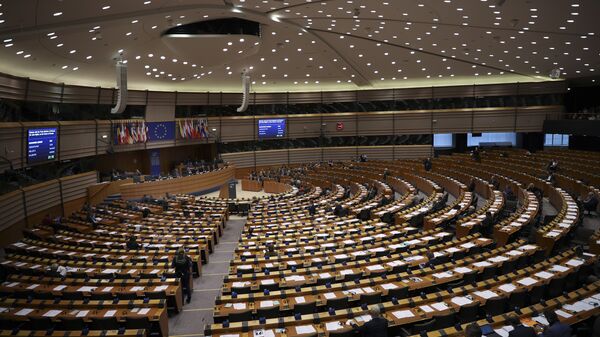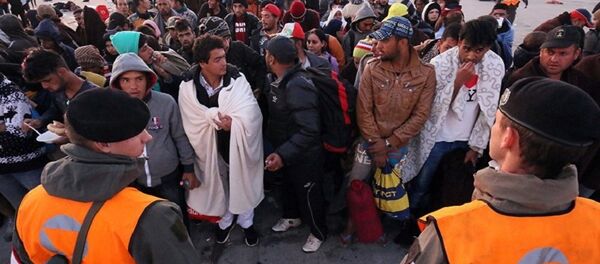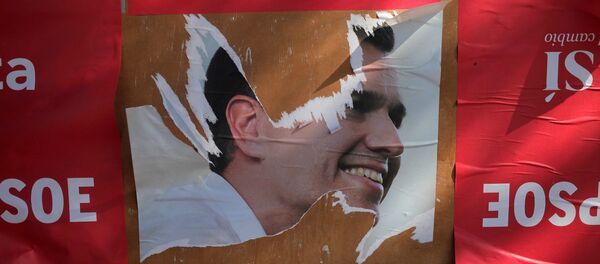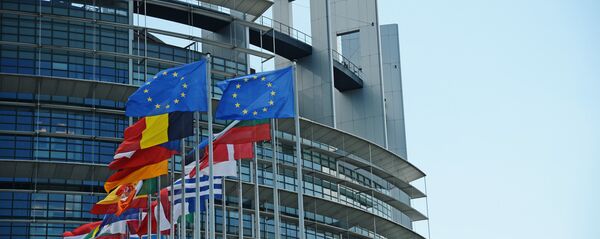Sputnik: Austrian comedy writers accuse the FPÖ of intimidation tactics, the Freedom Party is pitted against Austria’s main broadcaster. What is behind the scandals? Who benefits from the bullying campaign?
Andreas Molzer: The matter is easily to understand: It is about harming the FPÖ, this is why the left-wing mainstream media are producing scandals and are conducting a campaign. They hope the FPÖ will win less than expected at the European elections. We know this behaviour from previous elections and we also know the role that the public broadcaster ORF plays. In the light of the weakness of the opposition parties, the ORF is currently the spearhead of the campaign against FPÖ.
Andreas Molzer: First: There are several reasons why Eurosceptics won popularity. The main reason is the wave of illegal mass immigration in 2015. The people feel, that in the EU many things are developing in the wrong direction, that the EU is not able to protect its external borders; in the light of the influx of hundred thousands of Muslims, the people are worried about preserving their national and cultural identity. The dictate of political correctness, the Euro crisis, the lack of democracy and the ignorance of the elites in Brussels, for whom the interests of international corporations are more important than the worries of ordinary people, are also reasons why patriotic parties gain more and more popularity.
Second: The prospects to form a much larger group in the European Parliament than the current one are excellent. Italy’s interior minister Matteo Salvini is a politician who is popular not only in his homeland, but also in Austria and Germany. Another question is, what Nigel Farage, whose Brexit Party will win the elections in the UK, will do. On the other hand, it is not excluded that the Hungarian Fidesz party of Mr. Orbán will form a group in the European Parliament together with FPÖ, Lega or AfD.
Sputnik: If Eurosceptics win the majority in the EU Parliament, what consequences will it have on the bloc's politics and strategy?
Andreas Molzer: I don’t think it will affect the policy of the EU. There will be a fundamental shift in the policy of the EU only if the Eurosceptics win an absolute majority – which is not to be expected. Even if Conservatives (EPP) and Social Democrats (S&D) lose their majority, they will continue with either the Greens or the Liberals as before. As concerns the EPP, their lead candidate Manfred Weber has excluded any cooperation with eurosceptic and patriotic parties, although such cooperation would open the possibility for a fundamental change. That shows that there is no political will to change politics.
Andreas Molzer: The dominant parties in the European Parliament don’t really represent the interests of the member states. Because otherwise there would not be the already mentioned wrong developments like mass immigration, the dictates of political correctness or the lack of protection of the external borders. That also applies to relations with Russia. The dominant parties would have had it in their hands to prevent the sanctions against Russia. Only the patriotic freedom parties like FPÖ, Lega, Rassemblement National, etc. are representing the interests of the member states and want friendly relations with Russia.
Sputnik: Do you expect to see any changes in EU budget policy towards the countries facing mass migration flows, such as Italy, Greece and Austria?
Andreas Molzer: No, at present I see no sign that there is any change in this regard.
Andreas Molzer: That’s difficult to answer. Firstly, we don’t know if and when the British parliament will agree to the Brexit agreement. Secondly, also a so called hard Brexit cannot be ruled out. Thirdly, the EU has repeatedly clearly stated that it refuses to renegotiate the Brexit agreement. Therefore I cannot imagine that there will be further Brexit-negotiations. Above all: what is there to negotiate? Brussels will surely not accommodate the Britons because its wants to set a warning example so that no other member states comes up with the idea of leaving the EU.
Sputnik: How do you assess the UK's participation in the EU elections?
Andreas Molzer: As long as the UK is formally a member of the EU, the Britons legally have to participate in the EU elections. But it is also a crazy situation: Let’s assume the UK is in September no longer an EU member. Then the British MEPs would probably have only attended the opening session of the European Parliament for the new legislative period.
The views and opinions expressed by the speaker do not necessarily reflect those of Sputnik.




